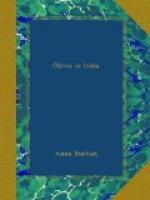I have learned a few useful Hindustani words. Qui hai means roughly, “Is anyone there?” and you cry that instead of ringing a bell, and it brings the instant response “Huzoor,” and a servant springs from nowhere to do your bidding. Lao means “bring” and jao “go.” You never say “please,” and you learn the words in a cross tone—that is, if you want to be really Anglo-Indian. Radical M.P.s of course will learn “please” at once, if there is such a word in the language, which I doubt. One nice globe-trotting old lady, anxious, like me, to conciliate the natives, was having a cup of chocolate at Peliti’s, and she insisted on sending out to see if the tikka-gharry wallah would like a cup!
A tikka-gharry is a thing like a victoria, hired by the hour. There are first, second, and third class tikka-gharries. The first class have two horses, the second one horse, and the third is closed, and, having no springs, is a terrible vehicle indeed. The drivers of these carriages have, as a rule, long whiskers, and are dressed in khaki. They have bags of provender for the horses tied behind the conveyance, where also precariously hangs another man who might be the twin-brother of the driver. I don’t know why he is there, but there he is.
G. and I love to set out in a tikka-gharry and practise our Hindustani. Starting early when it is fairly cool—Indian cold weather mornings are the most wonderful things, so fresh and so bright and so blue—G. starts us off at a mad gallop by shouting Juldi jao, which I have to calm down with Asti asti (slower). When we reach Peliti’s we cry Roko (stop), and get out to buy caramels, chocolates, and cakes for tea. Peliti has a peculiarly delicious kind of chocolate cake, the recipe for which I wish he would confide to Fuller or Buszard. But it isn’t the European shops, good as they are, that occupy our mornings. Much more fascinating haunts await us, the New Market and the China Bazaar. The former is a kind of arcade which contains everything that any reasonable person could require; fragrant fruit and flowers, fresh-smelling vegetables, and the wares of butcher and baker and candlestick-maker, all laid out on booths and stalls for the world to choose from.




